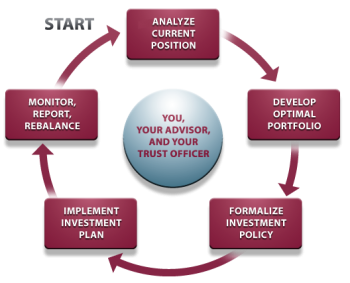Trust Investment: What you need to know as a Trustee

Unlike investing money for yourself, where caveat emptor – “let the buyer beware” – applies, investing as a Trustee is governed by a whole series of rules and regulations, which you ignore at your peril. This article is intended as a “beginners guide” to those rules and regulations as they apply in England & Wales (broadly similar rules apply in Scotland & Northern Ireland).
What investment powers does a Trustee have?
When acting as a Trustee and considering investing money within that Trust, your first port of call is the Trust Deed itself, to see what powers of investment you are given. Most Trust Deeds contain a series of clauses giving the Trustees various administrative powers and, generally, one of these will be in relation to investment. Some Wills that give rise to a Trust will have reference to the STEP (Society of Trust & Estate Practitioners) Standard Provisions, which is just a shortcut to save clogging-up the Will with several pages of technical prose. Most Trust Deeds containing an investment clause, and certainly those referring to the STEP Standard Provisions, provide Trustees with wide powers of investment.
Where the Trust Deed is silent on the subject of investment, or where there is no Trust Deed – a Statutory Trust for a minor beneficiary arising after someone has died Intestate (without a Will), for example – then the law steps-in and says what you can and can’t do. In this case, the “law” is the Trustee Act 2000. Even when Trustees have the widest possible powers of investment, they are obliged to follow the key principals espoused by this Act, as I explain later.
So what are the key principals of the Trustee Act 2000? They can be summarised as follows:
- Taking proper advice.
- Ensuring suitability.
- Maintaining diversification.
- Reviewing.
What does this mean in reality?
Taking proper advice
Proper advice, in this context, is from someone authorised and regulated by the Financial Conduct Authority (FCA) under the terms of the Financial Services & Markets Act 2000 (Regulated Activities) Order 2001 (as amended).
The FCA categorises regulated financial advisers in one of two ways, as follows:
- Independent advisers
- An adviser or firm that provides independent advice is able to consider and recommend all types of retail investment products that could meet your needs and objectives.
- Independent advisers will also consider products from all firms across the market, and have to give unbiased and unrestricted advice.
An independent adviser may also be called an ‘independent financial adviser’ or ‘IFA’.
- Restricted advisers
- A restricted adviser or firm can only recommend certain products, product providers, or both.
- The adviser or firm has to clearly explain the nature of the restriction. If you are not sure you should ask for further information, but some examples of restricted advice are where:
- The adviser works with one product provider and only considers products that company offers.
- The adviser considers products from several – but not all – product providers.
- The adviser can recommend one or some types of products, but not all retail investment products.
- The adviser has chosen to focus on a particular market, such as pensions, and considers products from all providers within that market.
Restricted advisers and firms cannot describe the advice they offer as ‘independent’.
Due Diligence
As a Trustee could well be asked to justify their choice of adviser at some point in the future, it stands to reason that selecting an independent adviser is much easier to justify than selecting a restricted adviser. There is a plethora of restricted advisers throughout the UK, so “due diligence” – why choose one restricted adviser over any of the others – is difficult, if not impossible to do. Having said that, it is still necessary to undertake robust due diligence on independent advisers, as not all IFAs have the experience and qualifications to advise on Trust investments, which is a highly specialist field.
The FCA recommends a series of questions you should ask a prospective adviser and, in a Trust situation, question 2 should be expanded to include reference to the adviser’s experience and qualifications specifically in relation to Trust investment matters.
Ensuring suitability
Legislators are fond of using words like “reasonable” and “suitable”, but with little or no further guidance as to what they mean in a particular context. In the context of trust investment, we can turn to case law for a definition and, as far back as 1883 (Speight v Gaunt), the principal of what a “prudent man of business” would do was established and which remains valid today. In other words it is a “common sense” approach – was it a sensible thing to do in all the circumstances.
This is now enshrined in statute, as the underlying principal of the Trustee Act 2000 is an overall duty of care.
What is “suitable” in practice?
The matters a Trustee should consider when investing money include:
-
What are the terms of the Trust?
Whose interests do I need to consider? Do I have to balance out the interests of a beneficiary given the income with those of another who eventually receives the capital? How long is the money going to be invested? Will I need to access the invested funds for administration expenses and/or distributions in the shorter term?
-
What type of investment is most suitable, given the foregoing considerations?
Is it cash? Is it fixed interest? Is it shares? Is it property? Is it some form of alternative investment? Is it a combination of all of these?
-
Is an “active” or a “passive” approach to investment appropriate?
My go-to text on Trust investment is, “Coldrick on Modern Trustee Investment: Law, Theory and Practice”, in which David Coldrick argues convincingly that Trustees should only invest passively. The basis of his argument is that Trustees only have a power to invest, not to speculate, and active investment is speculation not investing.
-
Is an ESG or more traditional strategy appropriate?
An ESG – Environment, Social and Governance – previously “Socially Responsible” or “Ethical” – strategy employs all the usual research tools available to the investment professional but also applies some additional filters. Negative, or “Responsible”, filters to screen-out sectors, industries, or individual companies that do harm to the plant, or fail to respect their staff/customers. Positive or “Sustainable” filters to screen-in sectors, industries, or individual companies that are making, or seeking to make, a positive impact to the planet or its people. Remember, however, that when acting in a fiduciary capacity you have a duty of care to the beneficiaries and cannot bring your personal biases to bear, unless they are commensurate with that overriding duty.
-
What is the tax treatment of investment returns?
Does taxation impact the choice of investment? Many Trusts are subject to Income Tax at the highest rate (45% in 2023/24) on income in excess of £1,000 per annum. Capital Gains Tax is levied at the higher rate (20% in 2023/24) (28% on residential property) with only half the annual Allowance (£3,000 in 2023/24). What costs will be incurred in reporting income and gains to HMRC? Is there a “tax-wrapper” available to minimise tax and tax administration?
-
What are the costs of investing and how will these impact investment returns?
Advice, management and custody charges can mount up. Can you get the same, or similar return, at a much lower cost? This adds credence to the passive investing argument as, generally, passive portfolios are less expensive to arrange and manage than active portfolios.
Maintaining diversification
This, perhaps, requires the least explanation, as Granny taught us about eggs and baskets, making it one of the oldest and best understood principals of investment.
By spreading an investment portfolio across:
- Different asset classes – cash, fixed interest, shares, property, and alternatives, for example, and
- Country, sector, industry, etc.,
Reduces risk and improves the prospects for positive returns.
What about when shares of one company are settled under Trust?
Special considerations arise when Trustees have a large holding of shares in one company, especially if they are shares in a family business, as diversification may be difficult at best or impossible at worst. However, Trustees cannot abrogate their responsibilities to review the investment they have; if anything the responsibilities are greater. Retention needs to be a positive decision, not a “passive” decision.
Reviewing
Whilst Trustees can delegate the day-to-day activities of investing to a suitably qualified professional, they cannot delegate their accountability. Consequently, Trustees must actively review what is being done in their name. The sign that says, “The buck stops here” remains firmly on the Trustee’s desk.
The review process should incorporate the above key principals, particularly the appointment of the adviser/manager; suitability, and diversification. It should also cover a more detailed analysis of performance, risk profile and progress towards achieving the long-term goals of the Trust. If it is an annual review, remember that beneficiaries are a year older. Will an interest terminate soon? Will a beneficiary inherit soon? Does the risk profile, strategy, etc., need adjusting with that in mind?
Recordkeeping
One of the oldest legal principals is the one that says, “If it isn’t written down it never happened”. Consequently, it is essential that everything a Trustee does, especially in relation to investment matters, is documented.
For Trusts governed by English & Welsh Law, the Trustee Act 2000 (Part IV Section 15, under 2a) states:
“The Trustee may not authorise a person to exercise any of their asset management functions as their agent unless –
a) They have prepared a statement that gives guidance as to how the functions should be exercised (a policy statement) and
b) The agreement under which the agent is to act includes a term to the effect that they will secure compliance with –
i) The policy statement, or
ii) If the policy statement is revised or replaced, the revised or replaced statement”
There are similar requirements in Northern Ireland and, in all other jurisdictions, having an effective Investment Policy Statement (IPS) would tend to be considered best practice.
What happens if something goes wrong?
Legal reference books are littered with cases of Trustees being sued by disgruntled beneficiaries and make no mistake, this could happen to you. If it does and you are found to have been negligent, it is a personal liability, not something you can take out of the funds in the Trust. However, if you have followed all the guidance in this article, particularly in terms of logical due diligence and documenting every stage of the process, a case against you will have much less of a chance of success.
Interestingly, there are virtually as many cases regarding Trustees that have been overly cautious as there are regarding Trustees who have been reckless in their investment approach. Often, Trustees have to leave their own prejudices and preferences, in relation to investing their own money, out of their considerations for investments they make as Trustees.
Don’t fall into the trap of thinking, “It’s all in the family”, so my children and/or grandchildren would never sue me. It is well known that families fall out more over money more than anything else, and that the plethora of cases I’ve already mentioned includes numerous family fallouts.
Are you deemed to be an investment expert?
Remember, if one of the Trustees is a professional – Solicitor, Accountant, or Financial Adviser, for example – there is a presumption at law that the professional, and, by association, all the Trustees are possessed of a higher level of knowledge and expertise pertaining to investment matters.
If you are acting as a Trustee and you are concerned about the prospect of future litigation, then it is possible to insure against this and one such policy is available from Castleacre Insurance. I’m not recommending this particular policy, merely using it as an example of the type of cover available; Trustees should undertake their own due diligence before arranging such a policy. Naturally, it is a prerequisite that Trustees applying for this cover have to certify that they are fully complying with the Trustee Act 2000.
The risk warning
The market value of investments and the income from them can go down as well as up. Shares may be subject to sudden and large falls in value and you may get back less than the amount invested.
Past performance is not a guide to the future.
Why choose Clive Barwell?
- I have been advising on Trust investments since the beginning of my career in 1971 and I hold the Trust Investment qualification administered by the Chartered Institute of Bankers as a part of their Trustee Diploma. I am also a Chartered Fellow of the Chartered Institute for Securities & Investments and a Registered Trust & Estate Practitioner.
- I follow a robust Statement of Investment Principles.
- I will provide a draft of the IPS and associated agreement referred to above, although independent legal advice in this important area should always be taken.
- The procedures adopted by Wren Sterling help Trustees to fulfil their obligations. The Investment Committee, chaired independently by Roderick Rennison, and with the considerable assistance of their external, independent investment analysts, RSMR, ensures that all of our investment solutions are: fit for purpose, adequately diversified and regularly reviewed.
What next?
If you are a Trustee and either have an existing portfolio you would like reviewed or are about to embark on a Trustee investment strategy, then contact me now for my advice, by completing the contact from below and I’ll give you a link to our risk profiling tool as a starter.







-

-

-

0800 074 8755info@clivebarwell.co.uk